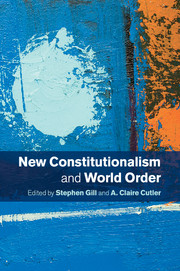Book contents
- Frontmatter
- Contents
- List of Figures
- List of Contributors
- Acknowledgements
- List of Acronyms
- 1 New constitutionalism and world order
- Part I Concepts
- Part II Genealogy, origins and world order
- Part III Multilevel governance and neo-liberalization
- Part IV Trade, investment and taxation
- Part V Social reproduction, welfare and ecology
- Part VI Globalization from below and prospects for a just new constitutionalism
- Glossary
- Appendix
- Bibliography
- Index
Part II - Genealogy, origins and world order
Published online by Cambridge University Press: 05 February 2014
- Frontmatter
- Contents
- List of Figures
- List of Contributors
- Acknowledgements
- List of Acronyms
- 1 New constitutionalism and world order
- Part I Concepts
- Part II Genealogy, origins and world order
- Part III Multilevel governance and neo-liberalization
- Part IV Trade, investment and taxation
- Part V Social reproduction, welfare and ecology
- Part VI Globalization from below and prospects for a just new constitutionalism
- Glossary
- Appendix
- Bibliography
- Index
Summary
Genealogy, origins and world order
Part II of the volume outlines some of the origins, purposes and forms of authority and power associated with liberal constitutions and world orders. The two chapters help illuminate what is ‘old’ and ‘new’ in the emerging new constitutional world order. They illustrate how historical struggles have forged dominant patterns of political authority and are now restructuring the global order. The main themes of Part II involve:
The genealogy of liberal constitutionalism, particularly that of the United States.
How liberal constitutionalism can be understood as a form of insurance on the part of dominant forces against threats to their power, privilege and property, stemming from popular and democratic forces.
The recent global convergence toward constitutional supremacy in light of the rapid spread of democratic politics.
Chapter 5 by Tim Di Muzio suggests that a deeper appreciation of historical struggles over the constitution of liberal political authority helps us to identify the links between what is ‘old’ and what is ‘new’ in the new constitutionalism. In mainstream political science, liberal constitutionalism is often deemed the most desirable framework for promoting material advancement and human freedom while circumscribing arbitrary, unjust and absolute rule. Di Muzio argues, however, that this conventional wisdom disregards how US constitutionalism was developed by a class-based political project that attempted to safeguard and legitimate an empire of liberty for an afl uent minority and forms of domination for the rest. Di Muzio’s genealogical enquiry focuses on key concepts in the political order of the West since at least the seventeenth century, and specifically how US colonial elites understood liberty, property and security during the American Revolutionary War and the subsequent constitutional settlement.
- Type
- Chapter
- Information
- New Constitutionalism and World Order , pp. 77 - 80Publisher: Cambridge University PressPrint publication year: 2014



